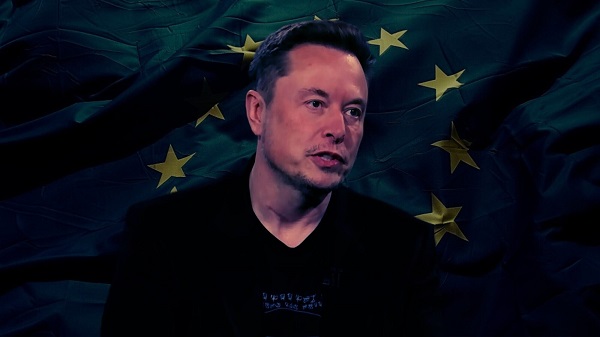Business
From X to SpaceX: EU Regulators Could Fine Musk Companies For Free Speech Push

From Reclaim The Net
|
The EU and Brazil are sharpening their regulatory knives, and who better to test their shiny new powers on than Elon Musk, the guy who seems to have made annoying pro-censorship bureaucrats his full-time hobby? Musk’s social media platform, X has become the latest target for both the European Union and Brazil — but they’re not just going after X anymore. The powers-that-be have decided that since X isn’t worth much these days, maybe they should slap fines on Musk’s other companies—SpaceX, Neuralink, xAI, and even the Boring Company—just because they can.
It’s the ultimate power move by regulators who seem to be more interested in flexing their muscles than addressing real issues. Why settle for a measly 6% fine on a struggling social media platform when you can drag in rockets, to pad the bill? The EU’s Latest Power Trip: Digital Services Act as a Blank Check Enter the Digital Services Act (DSA), the EU’s newest favorite tool for cracking down on “disinformation” and “hate speech” on major digital platforms. It’s got all the right buzzwords—”transparency,” “safety,” and “accountability”—but underneath the noble-sounding veneer, it’s starting to look more like a blank check for the EU to assert control over Big Tech. The law allows for fines of up to 6% of annual revenue for platforms that don’t comply. But when it comes to X, with its plummeting value—now at a measly $9.4 billion, according to Fidelity—the EU seems to be thinking, “Why stop at X when we can go after Musk’s entire empire?” Think about it: SpaceX, Neuralink, the Boring Company—what do they have to do with social media disinformation? Nothing, really. But the EU’s got a grudge, and they’re not about to let a little thing like fairness or logic get in their way. Musk’s decision to pull X out of the EU’s voluntary Code of Practice against disinformation in 2023 certainly didn’t help matters. Sure, he had initially played nice back in 2022, but when Musk realized that the EU’s idea of “voluntary” meant “you’ll comply, or else,” he bailed. Now, Brussels is retaliating by threatening to fine Musk’s companies that have nothing to do with social media, all while pretending this is about “protecting democracy.” If it sounds more like a personal vendetta than a reasoned policy decision, that’s because it probably is. Brazil Freezes Musk’s Assets: Free Speech or Free for All? Not to be outdone by their European counterparts, Brazil has decided to take its regulatory saber-rattling to new heights. The country’s highest court recently froze the assets of Starlink, Musk’s satellite internet venture, in an effort to squeeze a $3 million fine out of X for failing to censor content. That’s right—Brazil couldn’t get X to bend to their will, so they decided to take Musk’s satellites hostage. All in the name of combating “misinformation,” of course. What’s particularly galling about Brazil’s move is how blatantly it ignores the principles of free speech and open communication. The accusation that X “facilitated the spread of misinformation and hate speech” sounds noble on paper, but the way Brazil went about enforcing their demands—by freezing assets of an entirely separate company—looks more like strong-arm tactics than legitimate regulation. At this point, it’s hard to escape the conclusion that these governments are less concerned with disinformation and more interested in exerting control over tech companies that refuse to play by their increasingly arbitrary rules. Musk, who’s spent years promoting free speech as one of X’s core principles, is now facing a global game of whack-a-mole, with each country seemingly more eager than the last to punish him for refusing to fall in line. Personal Accountability or Public Power Play? One of the more interesting twists in the EU’s regulatory circus is the suggestion that they might hold Musk personally accountable under the DSA. Why? Because, according to the EU’s interpretation, “the entity exercising decisive influence” over a platform—whether that’s a company or an individual—can be on the hook for any wrongdoing. In other words, if Musk’s platform doesn’t comply, they’re coming for him directly. This is about using Musk as a punching bag to show the world that the EU is still in charge. Thomas Regnier, a spokesperson for the European Commission, helpfully clarified to Bloomberg, that the DSA’s rules apply “irrespective of whether the entity… is a natural or legal person,” which is bureaucrat-speak for, “We’re gunning for Elon.” |
|
|
|
Since you’re reading this, we hope you find Reclaim The Net useful. Today, we could use your help. We depend on supporters (averaging $15), but fewer than 0.2% of readers choose to give. If you donate just $5, (or the equivalent in your currency) you would help keep Reclaim The Net thriving for years. You don’t have to become a regular supporter; you can make a one-time donation. Please take a minute to keep Reclaim The Net going.
Thank you.
|
2025 Federal Election
Alcohol tax and MP pay hike tomorrow (April 1)

The Canadian Taxpayers Federation is calling on all party leaders to stop a pair of bad policies that are scheduled to happen automatically on April 1: pay raises for members Parliament and another alcohol tax increase.
“Party leaders owe taxpayers answers to these two questions: Why do you think you deserve a pay raise and why should Canadians pay higher taxes on beer and wine?” said Franco Terrazzano, CTF Federal Director. “Politicians don’t deserve a raise while millions of Canadians are struggling.
“And the last thing Canadians need is another tax hike when they pour a cold one or uncork a bottle with that special someone.”
MPs give themselves pay raises each year on April 1, based on the average annual increase in union contracts with corporations with 500 or more employees.
The CTF estimates tomorrow’s pay raise will amount to an extra $6,200 for backbench MPs, $9,200 for ministers and $12,400 for the prime minister, based on contract data published by the federal government.
After tomorrow’s pay raise, backbench MPs will receive a $209,300 annual salary, according to CTF estimates. A minister will collect $309,100 and the prime minister will take home $418,600.
Meanwhile, the alcohol escalator automatically increases excise taxes on beer, wine and spirits every year on April 1, without a vote in Parliament. Alcohol taxes will increase by two per cent tomorrow, costing taxpayers about $40 million this year, according to Beer Canada estimates.
The alcohol escalator tax has cost taxpayers more than $900 million since it was imposed in 2017, according to Beer Canada estimates.
“Politicians are padding their pockets on the same day they’re raising beer taxes and that’s wrong,” Terrazzano said. “If party leaders want to prove they care about taxpayers, they should stop the MP pay raises.
“And if party leaders care about giving Canadian brewers, distillers and wineries a fighting chance against tariffs, it’s time to stop hitting them with alcohol tax hikes year after year.”
The CTF released Leger polling showing 79 per cent of Canadians oppose tomorrow’s MP pay raise.
2025 Federal Election
Poilievre To Create ‘Canada First’ National Energy Corridor

From Conservative Party Communications
Poilievre will create the ‘Canada First’ National Energy Corridor to rapidly approve & build the infrastructure we need to end our energy dependence on America so we can stand up to Trump from a position of strength.
Conservative Leader Pierre Poilievre announced today he will create a ‘Canada First’ National Energy Corridor to fast-track approvals for transmission lines, railways, pipelines, and other critical infrastructure across Canada in a pre-approved transport corridor entirely within Canada, transporting our resources within Canada and to the world while bypassing the United States. It will bring billions of dollars of new investment into Canada’s economy, create powerful paycheques for Canadian workers, and restore our economic independence.
“After the Lost Liberal decade, Canada is poorer, weaker, and more dependent on the United States than ever before,” said Poilievre. “My ‘Canada First National Energy Corridor’ will enable us to quickly build the infrastructure we need to strengthen our country so we can stand on our own two feet and stand up to the Americans.”
In the corridor, all levels of government will provide legally binding commitments to approve projects. This means investors will no longer face the endless regulatory limbo that has made Canadians poorer. First Nations will be involved from the outset, ensuring that economic benefits flow directly to them and that their approval is secured before any money is spent.
Between 2015 and 2020, Canada cancelled 16 major energy projects, resulting in a $176 billion hit to our economy. The Liberals killed the Energy East pipeline and passed Bill C-69, the “No-New-Pipelines” law, which makes it all but impossible to build the pipelines and energy infrastructure we need to strengthen the Canadian economy. And now, the PBO projects that the ‘Carney cap’ on Canadian energy will reduce oil and gas production by nearly 5%, slash GDP by $20.5 billion annually, and eliminate 54,400 full-time jobs by 2032. An average mine opening lead time is now nearly 18 years—23% longer than Australia and 38% longer than the US. As a result of the Lost Liberal Decade, Canada now ranks 23rd in the World Bank’s Ease of Doing Business Index for 2024, a seven-place drop since 2015.
“In 2024, Canada exported 98% of its crude oil to the United States. This leaves us too dependent on the Americans,” said Poilievre. “Our Canada First National Energy Corridor will get us out from under America’s thumb and enable us to build the infrastructure we need to sell our natural resources to new markets, bring home jobs and dollars, and make us sovereign and self-reliant to stand up to Trump from a position of strength.”
Mark Carney’s economic advice to Justin Trudeau made Canada weaker while he and his rich friends made out like bandits. While he advised Trudeau to cancel Canadian energy projects, his own company spent billions on pipelines in South America and the Middle East. And unlike our competitors Australia and America, which work with builders to get projects approved, Mark Carney and Steven Guilbeault’s radical “keep-it-in-the-ground” ideology has blocked development, killed jobs, and left Canada dependent on foreign imports.
“The choice is clear: a fourth Liberal term that will keep our resources in the ground and keep us weak and vulnerable to Trump’s threats, or a strong new Conservative government that will approve projects, build an economic fortress, bring jobs and dollars home, and put Canada First—For a Change.”
-

 Uncategorized1 day ago
Uncategorized1 day agoPoilievre on 2025 Election Interference – Carney sill hasn’t fired Liberal MP in Chinese election interference scandal
-

 Business2 days ago
Business2 days agoCuba has lost 24% of it’s population to emigration in the last 4 years
-

 2025 Federal Election1 day ago
2025 Federal Election1 day ago2025 Federal Election Interference from China! Carney Pressed to Remove Liberal MP Over CCP Bounty Remark
-

 Censorship Industrial Complex1 day ago
Censorship Industrial Complex1 day agoWelcome to Britain, Where Critical WhatsApp Messages Are a Police Matter
-

 International2 days ago
International2 days agoTrump signs executive order to make Washington D.C. “safe and beautiful”
-

 Media1 day ago
Media1 day agoTop Five Huge Stories the Media Buried This Week
-

 2025 Federal Election1 day ago
2025 Federal Election1 day ago2025 Election Interference – CCP Bounty on Conservative Candidate – Carney Says Nothing
-

 Aristotle Foundation2 days ago
Aristotle Foundation2 days agoCanada has the world’s MOST relaxed gender policy for minors










